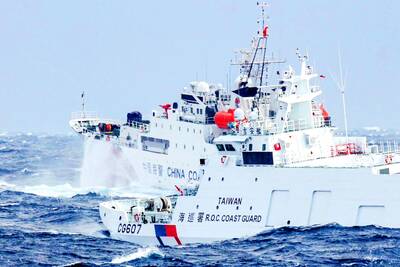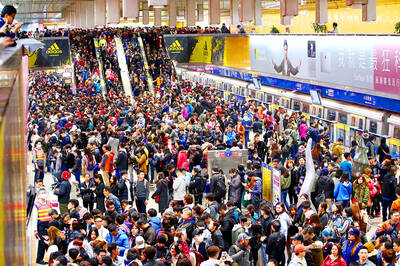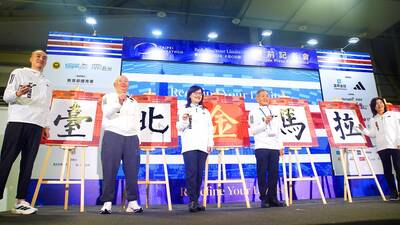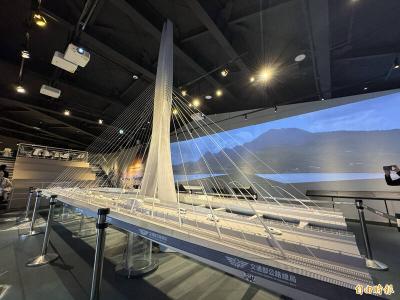Mainland Affairs Council (MAC) Chairwoman Lai Shin-yuan (賴幸媛) yesterday warned of the perils of allowing massive imports of Chinese products, saying the government must address the issue.
“Because of the special nature of cross-strait relations and the disparity between the two economies, Taiwan must take into consideration the potential impact on domestic industry and employment that may result from the massive import of Chinese goods,” Lai said.
Lai made the comments during a telephone interview with the International Community Radio Taipei station yesterday morning.
Lai said the next round of high-level talks between Straits Exchange Foundation (SEF) Chairman Chiang Pin-kung (江丙坤) and his Chinese counterpart, Association for Relations Across the Taiwan Strait (ARATS) Chairman Chen Yunlin (陳雲林), will be held after the Lunar New Year.
Issues on the agenda include establishing a cooperative mechanism for banking supervision, cross-strait securities and futures supervision, financial transactions, currency settlement, double taxation, investment protection, joint efforts to combat crime, and quarantine and inspection of farm products.
Both sides have also agreed to make arrangements for scheduled flights, regular passenger and cargo flights within the next six months, she said.
If all goes well, Lai said, she hoped agreements could be signed at the third Chiang-Chen meeting.
Speaking later yesterday at the monthly luncheon of the European Chamber of Commerce Taipei, Lai promised to further relax cross-strait policies, including allowing Chinese investment in Taiwan and easing restrictions on visits of Chinese technical, professional and business talent.
Liberalization will only “pump fresh vitality into Taiwan's economy, attracting more foreign businesses and transnational firms to invest in Taiwan,” she said in English.
“At the present stage of cross-strait relations, we can no longer treat the mainland as simply a threat, but must also look to it as a source of potential opportunity,” she said.
Lai acknowledged that cross-strait relations were “extremely complex,” and political differences were not easy to resolve within a short period of time.
Therefore, as the administration continues to work on improving cross-strait relations, it will also seek support from the international community, including the US, Japan and the EU, the MAC chief said.
“We hope that the relevant countries also can play a positive and active role in cross-strait interaction,” she said.
At a separate setting yesterday Tung Li-wen (董立文), a professor at the Department and Graduate School of Public Security of the Central Police University, said Beijing was likely to allow Taiwan to participate in the World Health Assembly in May this year.
Whether Beijing would give Taiwan more international space will depend on President Ma Ying-jeou's (馬英九) response, Tung said during a forum organized by the SEF to discuss cross-strait prospects.
Yang Kai-huang (楊開煌), a public affairs professor at Ming Chuan University, said Beijing might let Taiwan partake in international “activities” but would not easily budge on allowing Taiwan to join international “organizations.”
Tu Jenn-hwa (杜震華), a social science professor at National Taiwan University, said that unless the administration responds positively to Chinese President Hu Jintao's (胡錦濤) “six-point” remarks, he did not think cross-strait relations would make any substantive progress.
In related news, Central News Agency, citing a report by China's Xinhua news agency, said that Beijing had further eased restrictions on Chinese travel to Taiwan.
ARATS announced that beginning yesterday Chinese nationals with household registrations in Hebei, Shanxi, Jilin and nine other provinces and regions could now travel to Taiwan. These were in addition to the 13 provinces that had been approved earlier.
ADDITIONAL REPORTING BY STAFF WRITER

READY: The CGA said it closely monitored China’s maritime exercise, deployed vessels to shadow the Chinese ships one-on-one and set up emergency response centers Chinese navy and coast guard ships have returned to China, signaling the end of a massive maritime exercise, authorities said yesterday. The Coast Guard Administration (CGA) released images it said showed Chinese vessels sailing north in rough seas past Taiwan on Thursday, on their way to China. “All the Chinese coast guard went back to China yesterday, so although they have not officially made any announcement, we consider it over,” CGA Deputy Director-General Hsieh Ching-chin (謝慶欽) said. Beijing has not confirmed the drills and the Chinese Ministry of National Defense did not say whether the maneuvers had taken place when asked at a

People can take the Taipei MRT free of charge if they access it at Nanjing Sanmin Station or Taipei Arena Station on the Green Line between 12am and 6am on Jan. 1, the Taipei Department of Transportation said on Friday, outlining its plans to ease crowding during New Year’s events in the capital. More than 200,000 people are expected to attend New Year’s Eve events in Taipei, with singer A-mei (張惠妹) performing at the Taipei Dome and the city government’s New Year’s Eve party at Taipei City Hall Plaza, the department said. As people have tended to use the MRT’s Blue or

PUBLIC TRANSPORT: As some roads would be fully or partially closed, people are advised to take the MRT, with services expanded to accommodate more riders This year’s Taipei Marathon, which has obtained its first gold label certification from World Athletics, is to be held from 5am to 1pm tomorrow and would have 28,000 participants. The race is to start from the Taipei City Plaza and would go through major roads throughout the city, with traffic control implemented from 6am to 2pm, officials said. The Taipei Mass Rapid Transit (MRT) system and New Taipei City MRT Circle line would start operating at 5am on the day of the race, they said. The race would cover Renai Road, Xinyi Road, Hangzhou S Road, Aiguo east and west roads,

Upon its completion next year, the new Tamkang Bridge (淡江大橋) in New Taipei City is to be an important landmark in Taiwan, alongside Taipei 101, Minister of Transportation and Communications Chen Shi-kai (陳世凱) said today. The bridge is scheduled to be completed in December next year and open to the public in the first half of 2026, connecting New Taipei City’s Tamsui (淡水) and Bali (八里) districts. It is an asymmetric single-tower suspension bridge, nearly 70 stories tall, designed by world-famous architect Zaha Hadid. The bridge aims to alleviate traffic in Tamsui and on the Guandu Bridge (關渡大橋), in addition to increasing the